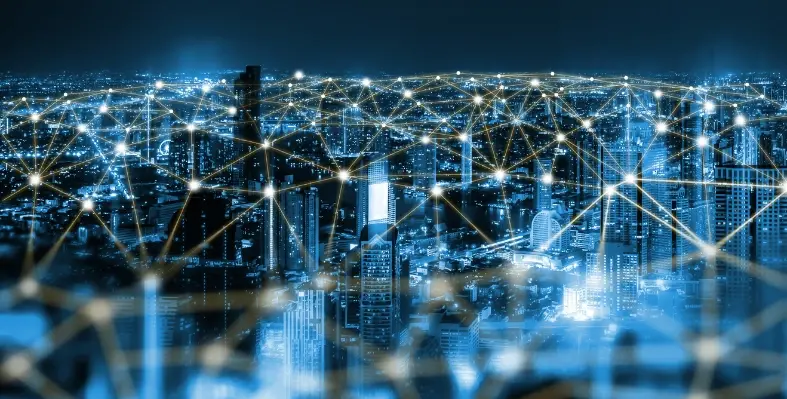As nations across the globe search for reliable, efficient and cost-effective ways to meet the needs of growing populations, interest in the development of smart cities continues to grow.
Nations like the UAE are pioneering the use of smart technologies and artificial intelligence to address energy concerns, optimise transit and improve public safety, leveraging real-time data from smart sensors and cameras to make informed decisions about city management.
Existing smart cities like Dubai demonstrate the potential for intelligent technologies to help streamline traffic investigations, cut energy waste and reduce crime, laying a foundation for emerging projects like Neom to develop innovative and forward-thinking safety infrastructure.
While many aspects of smart cities differ by project, all developments share a single central component. Video security systems provide the insights required to achieve smart city goals, meaning as projects become more ambitious, the features of video security systems evolve.
The role of video security in smart cities
Most major cities use video security systems to help deter crime, inform investigations and improve public safety, but the role of video security in smart cities is typically more involved as cameras become yet another sensor to leverage.
Traditional video security systems support passive workflows that rely on human operators continuously observing feeds and reviewing information to plan effective incident responses.
In smart cities, advanced technologies like data analytics and AI are used to enhance video security operations, helping operators to proactively address events with less mental strain.
The addition of smart technologies that can autonomously review video data, identify people and objects and inform real-time responses enables smart video security systems to support more advanced operations, ranging from traffic and waste management to law enforcement.
Examples of roles enhanced by video security systems in smart cities include:
- Traffic management: Solutions like Dubai’s Intelligent Traffic System use AI-driven cameras to automatically detect, record and warn law enforcement of road accidents.
- Waste management: AI cameras fixed to waste collection vehicles scan waste bins and roads to detect missed refuse and collect data used to improve collection routes.
- Disaster response: AI-informed sensors and cameras analyse real-time data to help detect and prevent disasters, one example being Dubai’s smart fire detection system.
- Law enforcement: Solutions like Abu Dhabi’s Falcon Eye system leverage insights from thousands of smart cameras to inform police of unfolding incidents in real-time.
The impact of smart city security technologies
Smart cities demonstrate the potential for intelligent technologies to transform the way safety and security incidents are addressed in modern society; data published by McKinsey reveals existing solutions can improve some quality-of-life indicators for citizens by as much as 30%.
In the same report, researchers suggest cities that leverage smart technologies could reduce fatalities by up to 10% and violent crimes by as much as 40%, with wider reports from Dubai revealing AI-informed security systems have already helped to reduce serious crime by 25%.
The growth of smart cities has seen video security transition away from resource-intensive, passive monitoring operations towards more proactive workflows, with leaders prioritising systems that help operators not only respond to incidents in real-time, but also anticipate potential threats.
As smart city developments become more ambitious, this theme is being expanded, with the advent of advanced GenAI-powered solutions driving new evolutions in smart video security.
The future of video security in the smart city era
To further enhance the capabilities of smart city video security solutions, new technologies are leveraging cutting-edge AI to streamline complex workflows and address unique threats.
The smart analytics solution Avigilon Unity Visual Alerts, for example, helps users overcome the limitations of existing tools that can often only detect simple objects like people and cars.
Through tools like Focus of Attention, powerful AI-based search and customisable AI-based Visual Alerts, users can set rules to alert for custom threats using natural language, enabling operators to receive real-time notifications for potential security events and then quickly find related video of specific events without manually combing through footage.
In a smart city context, these advanced AI analytic capabilities can alert operators to unusual activity, such as signs of a crowd forming, safety risks such as flooding or fire, or traffic at specific times and locations.
Solutions like Visual Alerts represent the natural evolution of smart video security as a tool to help prevent security, safety and environmental threats as well as respond more quickly to them. Informed by data-rich, specific security alerts sent to handheld devices, responders across the city can make fast, well-informed decisions.
The Middle East is a global leader in smart city infrastructure, with existing smart cities like Dubai and emerging projects like Neom paving the way for the future of urban development.
Of all the technologies that power smart cities, video security systems stand among the most important, providing required insight into most major aspects of day-to-day city management.
As smart cities become more advanced, video security technologies evolve, with emerging AI-powered solutions helping officials take a more proactive approach to creating safer cities.
About the author
Steven Mueller, senior product manager for Avigilon Unity at Motorola Solutions, has over a decade of experience in product within the video security sector. He is deeply knowledgeable about how AI and other emerging technologies can be leveraged to address security challenges, and is committed to creating solutions that facilitate response to increase safety.








